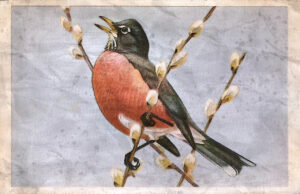
The month of April has come and gone, but its poetic spirit still lingers in my heart. April is National Poetry Month. And as it happens, William Shakespeare was born in April (as was I, tee-hee!)
By reading and writing poetry, my prose writing improves. I learn the importance of choosing the most impactful words. By nature, poetry features brevity, so Every. Word. Counts. One strong word trumps multiple weaker ones. Instead of saying: walked quietly, say: crept. Instead of saying: he moved his hand back and forth, say: he waved. Instead of saying: she jumped up and down, say: she bounced.
I also learn that using effective metaphor and simile to paint pictures in the reader’s mind adds a valuable layer of understanding. Instead of saying: It was hot and humid, say: The air was a heavy, soggy blanket draped across the land. Instead of saying: It was cold, say: The frigid air snapped and crackled around us.
Lines of poetry stick in our minds:
I think that I shall never see a poem lovely as a tree.—Joyce Kilmer: “Trees”
Do not go gentle into that good night.—Dylan Thomas: “Do Not Go Gentle Into That Good Night”
Shall I compare thee to a summer’s day?—William Shakespeare: “Sonnet 18”
One of my favorite poems that embodies these elements of poetry is:
Hope Is The Thing With Feathers
—Emily Dickinson
“Hope” is the thing with feathers –
That perches in the soul –
And sings the tune without the words –
And never stops – at all –
And sweetest – in the Gale – is heard –
And sore must be the storm –
That could abash the little Bird
That kept so many warm –
I’ve heard it in the chillest land –
And on the strangest Sea –
Yet – never – in Extremity,
It asked a crumb – of me.

Thanks for stopping by. Y’all come back now! (And comment with the title of your favorite poem!)
Kathryn